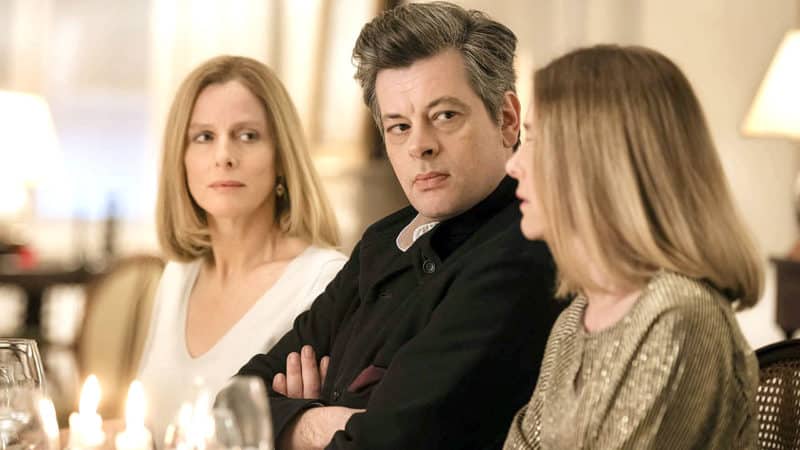Festivals have returned to cinemas and look here to stay. The New Zealand International Film Festival has moved to later in the year, hoping to get newer entries, but leaving a gap filled by France and Italy.
French festivals have long been strongly supported by its government-backed industry. Last year, due to the Covid-19 shutdown, the festival was available online throughout the world, with a selection on Amazon Prime. This year, 20 movies are being shown in 12 locations throughout the country.
The Italian festival has had a rockier path, and was in recess for a while. It now seems on a sturdier footing, with a 64-page printed programme, 20 films and 21 venues.
Both have a mix of old and new. The first-in-this-country titles are mainly pre-Covid, reflecting the loss of production during 2020, and are by a new generation of filmmakers.
Marc Fitoussi’s Appearances (Les apparences) (Palace Films) is a noirish thriller that can trace its origins back to Henri-Georges Clouzot’s Le corbeau (The Raven), made during World War II about a village ravaged by poison-pen letters.
In the updated version, an email by a young female teacher to her lover, an orchestra conductor (Benjamin Biolay), is forwarded by his wife (Karin Viard) to the other parents in Vienna’s French school.
The plot then moves into the territory of another classic French director, Claude Chabrol, as middle-class respectability is torn apart by jealousy, infidelity and obsession. In Chabrol’s Juste avante la nuit (Just Before Nightfall, 1971) a man gets away with murder, but is forever condemned by his own guilt.
It is no different for Viard and Biolay as the expat couple grappling with the fallout from the email and a homicide. Viard (Lolo, The Bélier Family) dominates this taut thriller in the same way as Michelle Pfeiffer did in French Exit, suggesting youth is no match for maturity in much contemporary cinema.
This is further confirmed by Italy’s Valeria Bruni Tedeschi (Human Capital, The Summer House) in Dominik Moll’s Only the Animals (Seules les bêtes) (Rialto Distribution) as a wealthy 50-ish business owner with a preference for young women.
Her body turns up early in a Hitchcockian plot (based on Colin Niel’s novel), with five characters and set in the wintry Massif Central, where farming activity is restricted to feeding housed livestock.
Each has a series of scenes that fit together like pieces of a jigsaw puzzle to reveal the circumstances of her death. This long-winded approach slows the pace, as does the necessity of online conversations between an African scammer in Abidjan (the French equivalent of the Nigerian variety) and his gullible victim, whose wife is having an affair with the neighbour who finds the body. This is one time when further plot description is unwise. Suffice to say the Chabrol tradition of an unintended murder and its consequences is still alive in France.
Ratings: Appearances: Mature audiences. 108 minutes. Only the Animals: Mature audiences. 117 minutes
Clips
Love Affair(s)
(Les chose qu’on dit, les choses qu’on fait)
(Hi Gloss Entertainment)
Writer-director Emmanuel Mouret also draws from French movies of the past – the romantic entanglements of La Ronde (1950) by
Max Ophüls and based on the Viennese play by Arthur Schnitzler. Half a dozen or so middle-class Parisians are interlinked when
a young man (Niels Schneider) and his cousin’s pregnant wife (Camélia Jordana), who are staying at a country house in Avignon,
recount their past love lives. The cousin, played by a bearded, hang-dog Vincent Macaigne, is the least likeable of a self-centred
bunch who are given to intellectualising their shallow emotions. An exception is his ex-wife (Émilie Dequenne), who is inspired
by a TV guru to demonstrate that love is ensuring the happiness of others – but with a twist. The ending is not what you would
expect, but the soundtrack of classical music provides some compensation. Rating: Mature audiences. 122 minutes.
The Conjuring: The Devil Made Me Do It
(Universal/Warner Bros)
Self-styled demonologist Ed Warren and his clairvoyant wife Lorraine, played by the earnest Patrick Wilson and Vera Farmiga,
are back in America from Britain, where they grappled with kinetic furniture in The Conjuring 2. Like other movies featuring
the Warrens (the Annabelle and The Amityville Horror series), their roles are exaggerated. In a 1981murder trial, Arne Johnson
pleaded demonic possession after the Warrens witnessed an exorcism of his fiancée’s eight-year-old brother. They pursue
their prey to a creepy house and the source of a witch’s curse. Exorcisms and paranormal activity demand a degree of audience
buy-in (or lack of credulity) and James Wan, the Australian director behind many of these movies, knows his stuff. His acolyte,
director Michael Chaves, opts for more of a police thriller than classic horror. This may leave fans wanting more of the latter
the next time round. Rating: Restricted to audiences over 16. 112 minutes.
Lapsis
(Maslow Entertainment)
This intriguing and ingenious debut by writer-director Noah Hutton, who also edited and composed the musical score, ranks
alongside the work of Mike Cahill (Bliss, Another Earth, I Origins) in creating alternate worlds. Nano-speed or Quantum computing
for financial markets requires laying cables and linking huge square junction boxes. This task is performed by contractors
working on a ”ride share” or gig basis. The cable companies are all part of a monopoly, and they also employ robots to ramp
up the productivity of their human rivals. It’s an Orwellian setup that attracts desperate people, such as a courier driver (Dean
Imperial), who needs money for a suspect clinic that is treating his brother for a chronic fatigue disease. Another is a woman
(Madeline Wise), who leads an activist group that is out to destroy the robots. While the message may be standard anti-technology
capitalism, the metaphor of the cablers’ seemingly pointless, but well-rewarded, labour requires a little more imagination. Rating:
Parental guidance advised. 108 minutes.

Reader Interactions